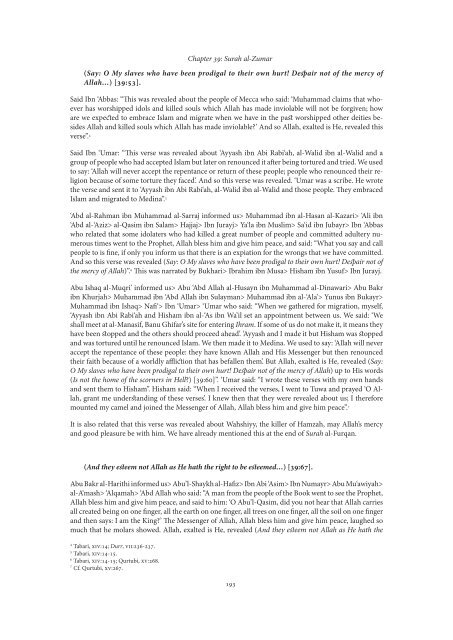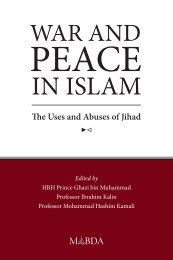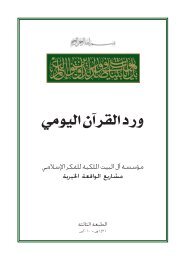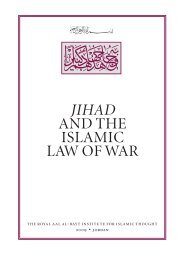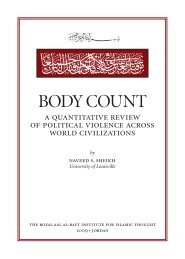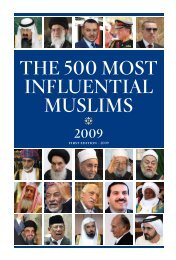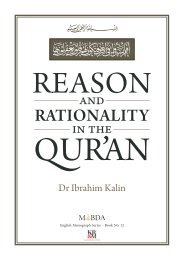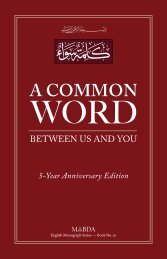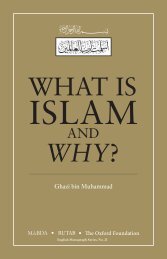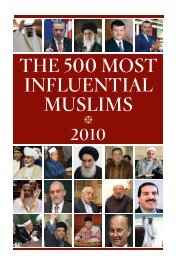Al-W¥^idÏ's Asb¥b al-Nuz‰l - The Royal Islamic Strategic Studies ...
Al-W¥^idÏ's Asb¥b al-Nuz‰l - The Royal Islamic Strategic Studies ...
Al-W¥^idÏ's Asb¥b al-Nuz‰l - The Royal Islamic Strategic Studies ...
Create successful ePaper yourself
Turn your PDF publications into a flip-book with our unique Google optimized e-Paper software.
Chapter 39: Surah <strong>al</strong>-Zumar<br />
(Say: O My slaves who have been prodig<strong>al</strong> to their own hurt! Despair not of the mercy of<br />
<strong>Al</strong>lah…) [39:53].<br />
Said Ibn ‘Abbas: “This was reve<strong>al</strong>ed about the people of Mecca who said: ‘Muhammad claims that whoever<br />
has worshipped idols and killed souls which <strong>Al</strong>lah has made inviolable will not be forgiven; how<br />
are we expected to embrace Islam and migrate when we have in the past worshipped other deities besides<br />
<strong>Al</strong>lah and killed souls which <strong>Al</strong>lah has made inviolable’ And so <strong>Al</strong>lah, ex<strong>al</strong>ted is He, reve<strong>al</strong>ed this<br />
verse”. 4<br />
Said Ibn ‘Umar: “This verse was reve<strong>al</strong>ed about ‘Ayyash ibn Abi Rabi‘ah, <strong>al</strong>-W<strong>al</strong>id ibn <strong>al</strong>-W<strong>al</strong>id and a<br />
group of people who had accepted Islam but later on renounced it after being tortured and tried. We used<br />
to say: ‘<strong>Al</strong>lah will never accept the repentance or return of these people; people who renounced their religion<br />
because of some torture they faced’. And so this verse was reve<strong>al</strong>ed. ‘Umar was a scribe. He wrote<br />
the verse and sent it to ‘Ayyash ibn Abi Rabi‘ah, <strong>al</strong>-W<strong>al</strong>id ibn <strong>al</strong>-W<strong>al</strong>id and those people. <strong>The</strong>y embraced<br />
Islam and migrated to Medina”. 5<br />
‘Abd <strong>al</strong>-Rahman ibn Muhammad <strong>al</strong>-Sarraj informed us> Muhammad ibn <strong>al</strong>-Hasan <strong>al</strong>-Kazari> ‘<strong>Al</strong>i ibn<br />
‘Abd <strong>al</strong>-‘Aziz> <strong>al</strong>-Qasim ibn S<strong>al</strong>am> Hajjaj> Ibn Jurayj> Ya‘la ibn Muslim> Sa‘id ibn Jubayr> Ibn ‘Abbas<br />
who related that some idolaters who had killed a great number of people and committed adultery numerous<br />
times went to the Prophet, <strong>Al</strong>lah bless him and give him peace, and said: “What you say and c<strong>al</strong>l<br />
people to is fine, if only you inform us that there is an expiation for the wrongs that we have committed.<br />
And so this verse was reve<strong>al</strong>ed (Say: O My slaves who have been prodig<strong>al</strong> to their own hurt! Despair not of<br />
the mercy of <strong>Al</strong>lah)”. 6 This was narrated by Bukhari> Ibrahim ibn Musa> Hisham ibn Yusuf> Ibn Jurayj.<br />
Abu Ishaq <strong>al</strong>-Muqri’ informed us> Abu ‘Abd <strong>Al</strong>lah <strong>al</strong>-Husayn ibn Muhammad <strong>al</strong>-Dinawari> Abu Bakr<br />
ibn Khurjah> Muhammad ibn ‘Abd <strong>Al</strong>lah ibn Sulayman> Muhammad ibn <strong>al</strong>-‘<strong>Al</strong>a’> Yunus ibn Bukayr><br />
Muhammad ibn Ishaq> Nafi‘> Ibn ‘Umar> ‘Umar who said: “When we gathered for migration, myself,<br />
‘Ayyash ibn Abi Rabi‘ah and Hisham ibn <strong>al</strong>-‘As ibn Wa’il set an appointment between us. We said: ‘We<br />
sh<strong>al</strong>l meet at <strong>al</strong>-Manasif, Banu Ghifar’s site for entering Ihram. If some of us do not make it, it means they<br />
have been stopped and the others should proceed ahead’. ‘Ayyash and I made it but Hisham was stopped<br />
and was tortured until he renounced Islam. We then made it to Medina. We used to say: ‘<strong>Al</strong>lah will never<br />
accept the repentance of these people: they have known <strong>Al</strong>lah and His Messenger but then renounced<br />
their faith because of a worldly affliction that has bef<strong>al</strong>len them’. But <strong>Al</strong>lah, ex<strong>al</strong>ted is He, reve<strong>al</strong>ed (Say:<br />
O My slaves who have been prodig<strong>al</strong> to their own hurt! Despair not of the mercy of <strong>Al</strong>lah) up to His words<br />
(Is not the home of the scorners in Hell) [39:60]”. ‘Umar said: “I wrote these verses with my own hands<br />
and sent them to Hisham”. Hisham said: “When I received the verses, I went to Tuwa and prayed ‘O <strong>Al</strong>lah,<br />
grant me understanding of these verses’. I knew then that they were reve<strong>al</strong>ed about us; I therefore<br />
mounted my camel and joined the Messenger of <strong>Al</strong>lah, <strong>Al</strong>lah bless him and give him peace”. 7<br />
It is <strong>al</strong>so related that this verse was reve<strong>al</strong>ed about Wahshiyy, the killer of Hamzah, may <strong>Al</strong>lah’s mercy<br />
and good pleasure be with him. We have <strong>al</strong>ready mentioned this at the end of Surah <strong>al</strong>-Furqan.<br />
(And they esteem not <strong>Al</strong>lah as He hath the right to be esteemed…) [39:67].<br />
Abu Bakr <strong>al</strong>-Harithi informed us> Abu’l-Shaykh <strong>al</strong>-Hafiz> Ibn Abi ‘Asim> Ibn Numayr> Abu Mu‘awiyah><br />
<strong>al</strong>-A‘mash> ‘<strong>Al</strong>qamah> ‘Abd <strong>Al</strong>lah who said: “A man from the people of the Book went to see the Prophet,<br />
<strong>Al</strong>lah bless him and give him peace, and said to him: ‘O Abu’l-Qasim, did you not hear that <strong>Al</strong>lah carries<br />
<strong>al</strong>l created being on one finger, <strong>al</strong>l the earth on one finger, <strong>al</strong>l trees on one finger, <strong>al</strong>l the soil on one finger<br />
and then says: I am the King’ <strong>The</strong> Messenger of <strong>Al</strong>lah, <strong>Al</strong>lah bless him and give him peace, laughed so<br />
much that he molars showed. <strong>Al</strong>lah, ex<strong>al</strong>ted is He, reve<strong>al</strong>ed (And they esteem not <strong>Al</strong>lah as He hath the<br />
4<br />
Tabari, :14; Durr, :236-237.<br />
5<br />
Tabari, :14-15.<br />
6<br />
Tabari, :14-15; Qurtubi, :268.<br />
7<br />
Cf. Qurtubi, :267.<br />
193


